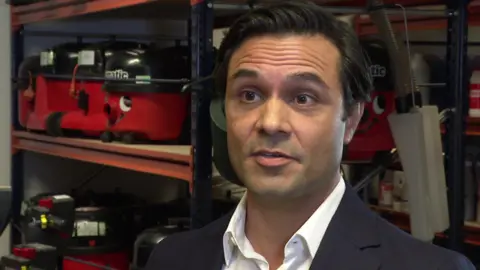
 Getty Images
Getty Images
Millions of people will be able to get sick pay from the first day they are ill and claim unpaid parental leave as soon as they start a job, in a major overhaul of workers' rights.
However, certain measures in the Employment Rights Bill have been criticised for being watered down or delayed.
Most of the planned changes will not take effect for two years following a period of consultation.
The government said the bill marked the "biggest upgrade to rights at work for a generation", but business groups are concerned about how the changes will work in practice.
The government is seeking to be pro-worker and pro-business and striking that balance means that much of the detail is still to be decided.
As part of the plans, the existing two-year qualifying period for protections from unfair dismissal will be removed.
Ministers have said this will benefit about nine million workers who have been with their current employer for less than two years.
However, workers will be subject to a proposed nine-month probation period when they can still be sacked without a full process.
If a worker is sacked within those nine months, it is unclear under what circumstances they can make a claim for unfair dismissal and when they cannot.
What else will change?
"We’re raising the floor on rights at work to deliver a stronger, fairer and brighter future of work for Britain," said Deputy Prime Minister Angela Rayner.
'Clumsy and chaotic'
Many big business groups welcomed the plans, with the CBI saying the government deserved credit for engaging with employers and unions when working on the bill.
Ann Francke of the Chartered Management Institute, said that for many firms the proposed changes "won't create much of a challenge, as the government is in many cases just formalising practices that smart employers already follow".
However, while that may be the case for big businesses, smaller firms may be left "scrabbling to make sense" of the changes, according to Tina McKenzie, policy chair at the Federation of Small Businesses, whose members employ up to 250 workers.
She said the new bill was a "rushed job, clumsy, chaotic and poorly planned".
The government will also consult on a new probation period for new hires, with a recommendation of nine months, despite a previous suggestion of six months.
It proved a tricky subject during discussions, with some trade unions worried that a short period of probation could make firms reluctant to take on new staff, or they could even cut jobs.


Dominic Ponniah says his cleaning firm is delaying hiring plans
Dominic Ponniah, the boss of Cleanology, told the BBC his firm is delaying hiring plans and being more cautious of who it takes on.
His cleaning company has about 1,300 employees located from Scotland to Southampton.
"It's just another thing that businesses have to contend with," he said, adding that the new rules around sick pay, unfair dismissal and probationary periods would make business "very, very nervous".
The matter of zero-hours contracts has also been hotly debated.
Under the new bill, workers on such contracts will have to be offered a guaranteed-hours contract based on the hours they have clocked up during a 12-week period, and will be entitled to "reasonable" notice of any shift changes, as well as compensation if a shift is cancelled or cut short.
Zero-hours contracts have come in for criticism in the past as the likes of factory or warehouse workers have missed out on a steady income and certain benefits.
But UKHospitality said it is the preferred policy for workers in their sector.
'Long way to go'
Gary Smith, general secretary of the GMB union, said the bill gave workers "the rights they've been denied for so long", but added there was a "long way to go".
"The legislation must be watertight and without loopholes that could be used by those wanting to delay the rights workers so desperately need," he said.
Some measures included in Labour's plan to "Make Work Pay", issued in the run-up to the General Election, will not feature in the bill either.
The "right to switch off" stopping employers contacting staff out of hours, for example, will be addressed separately.
Conservative shadow business secretary Kevin Hollinrake said the party would look closely at the detail of what Labour has set out.
"But businesses and the economy needs certainty, not the threat of being sent back to the 1970s, unleashing waves of low-threshold, zero-warning strikes, driving down growth and slowing productivity," he said.



 Movie
Movie 3 months ago
74
3 months ago
74 






![Presidents Day Weekend Car Sales [2021 Edition] Presidents Day Weekend Car Sales [2021 Edition]](https://www.findthebestcarprice.com/wp-content/uploads/Presidents-Day-Weekend-car-sales.jpg)



 English (United States)
English (United States)